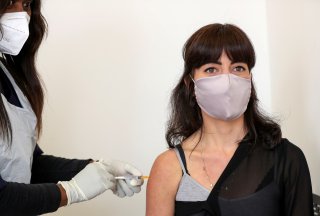Majority of Americans Said They Won’t Get a Coronavirus Vaccine Before the Election
Political influence and partisanship could have a major impact on the public’s ability to trust health officials and experts.
Americans have grown skeptical towards public health experts and officials, as a majority said they would not get a coronavirus vaccine if it was approved by the Food and Drug Administration (FDA) before election day, a new poll reported.
Fifty-four percent of respondents said they wouldn’t want to take it, with only 42 percent saying they would want to get vaccinated, according to a poll conducted by the Kaiser Family Foundation (KFF) released Thursday. Half of Democrats, roughly 50 percent, said they would get vaccinated if it is available, while 56 percent of Independents and 60 percent of Republicans would not get it.
The survey also found that more than half of respondents, or 62 percent, said they were concerned that the political pressure from President Donald Trump’s administration would cause the FDA to rush to approve of a coronavirus vaccine before it is proven to be safe and effective. This includes 85 percent of Democrats, 61 percent of Independents and 35 percent of Republicans.
In recent weeks, Trump has boosted pressure on the FDA to move forward with a vaccine, arguing that the “deep state” that exists at the agency has prevented it from rapidly approving of one. After the president’s remarks, the FDA declared an emergency use authorization for convalescent plasma to treat current patients, despite disapproving of the method as there wasn’t enough evidence to prove it to be safe and effective.
Almost all of the respondents, or 81 percent, including majorities across party lines, don’t even think a vaccine will be available prior to election day.
The survey also found that political influence and partisanship could have a major impact on the public’s ability to trust health officials and experts.
“Public skepticism about the FDA and the process of approving a vaccine is eroding public confidence even before a vaccine gets to the starting gate,” KFF President and CEO Drew Altman said in a statement.
About two in three adults claimed to have at least a “fair amount” of trust in Dr. Anthony Fauci, the director of the National Institute of Allergy and Infectious Diseases and a member of the White House coronavirus task force, to provide reliable information about the virus. About 67 percent of respondents have the same trust in the Centers for Disease Control and Prevention (CDC), while only 53 percent said the same for Dr. Deborah Birx, the coronavirus response coordinator for the White House coronavirus task force.
Among Democrats, 86 percent trusted Fauci to provide reliable information about the deadly disease, while just 48 percent of Republicans said the same.
The overall trust in Fauci has declined since April, likely due to the colliding relationship between Trump and the public health expert, as the president has publicly attacked him for his coronavirus remarks and suggestions.
Half of the respondents said they had a “fair amount” of trust in Democratic presidential nominee Joe Biden to provide reliable information on the virus at 52 percent, while 40 percent said the same about Trump.
Although vaccine concerns dominated the KFF poll, registered voters labeled the economy as the top issue for the upcoming presidential election. Thirty-two percent of respondents said the economy was the most important issue, followed by 20 percent saying the coronavirus outbreak.
The poll was conducted from Aug. 28 to Sept. 3 among 1,199 adults, with a margin of error of plus or minus 3 percent for the full sample.
Rachel Bucchino is a reporter at the National Interest. Her work has appeared in The Washington Post, U.S. News & World Report and The Hill.
Image: Reuters

